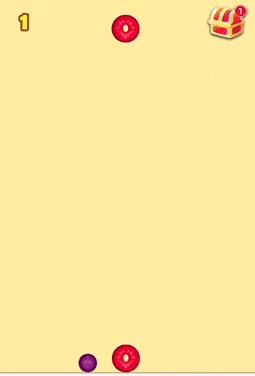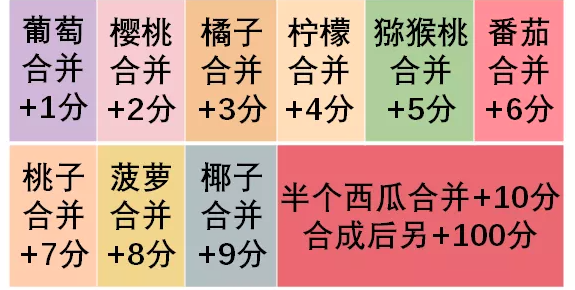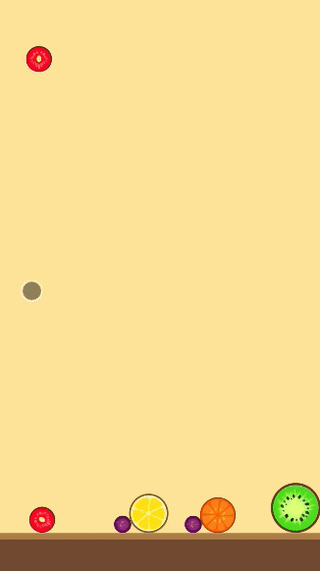使用Phaser3+Matter.js实现“合成大西瓜”游戏
最近有一款“合成大西瓜”的小游戏有点火,试玩了一下,玩法比较简单,实现难度也不大,所以参照游戏原型自己实现了一下,游戏开发主要使用了Phaser游戏框架,本文主要分享游戏功能的具体实现,对框架使用的API不会做过多介绍。
玩法分析
首先简单介绍下游戏的玩法:控制水果从上方掉落,两个相同水果会合成一个更大的水果,最终合成一个大西瓜,效果展示:

游戏的玩法在于合理控制下落的点避免空间的浪费,在顶部有一条“死亡线”,当水果超过这个高度就结束,有点像俄罗斯方块,每合成一次水果都会得分,看谁能在游戏结束前或得更高的分数
有多少种水果
游戏总共会出现11种水果,经过观察,前5种水果会随机掉落,后面的水果都是合成才会出现的

如何计算得分
每次合成新水果都会得分,按顺序的话第一种是1分,第二种2分,第10种就是10分,最后合成大西瓜后是额外得100分:

快速开始
游戏的基本玩法都已经清楚了,接下来就是开发了,首先我们通过Github上clone一个phaser3的脚手架来进行开发,我们首选Typescript版本的,对于这种复杂的框架,类型提示真的非常方便。
1
2
3
4
5
6
| git clone git@github.com:photonstorm/phaser3-typescript-project-template.git hexigua
cd hexigua
npm install
npm run watch
|
安装依赖并启动后,进入src/game.ts,把原来的一些示例代码删掉,结果如下:
1
2
3
4
5
6
7
8
9
10
11
12
13
14
15
16
17
18
19
20
21
22
23
| import 'phaser';
export default class Demo extends Phaser.Scene
{
constructor (){
super('demo');
}
preload () {
}
create () {
}
}
const config = {
type: Phaser.AUTO,
backgroundColor: '#125555',
width: 800,
height: 600,
scene: Demo
};
const game = new Phaser.Game(config);
|
preload和create都属于框架的生命周期,preload主要用于预先下载资源,create用于创建对象或事件。
修改config 参数
修改游戏初始化参数,指定使用Matter.js物理引擎,缩放模式通常设置为等比例缩放模式Phaser.Scale.FIT,
1
2
3
4
5
6
7
8
9
10
11
12
13
14
15
16
17
| const config = {
type: Phaser.AUTO,
backgroundColor: '#ffe8a3',
mode: Phaser.Scale.FIT,
physics: {
default: 'matter',
matter: {
gravity: {
y: 2
},
debug: true
}
},
width: window.innerWidth,
height: window.innerHeight,
scene: Demo
};
|
加载资源
接下在preload函数中加载准备好的图片, 前面我已经准备好了11中类型水果的图片,为了方便开发,分别命名为1-11.png
1
2
3
4
5
6
7
8
9
| preload(){
for (let i = 1; i <= 11; i++) {
this.load.image(`${i}`, `assets/${i}.png`)
}
this.load.image('ground', 'assets/ground.png')
}
|
新建水果
加载资源后,我们先来创建游戏中最主要的对象水果,游戏中水果出现的情况有两种,一种是在顶部落下,一种是碰撞后生成,除了位置不同,还有状态和类型也不同,用一个表示如下:
| 出现位置 |
状态 |
类型 |
| 顶部 |
先静止点击后落下 |
前5种随机 |
| 合成后的位置 |
非静止 |
上一种+1 |
把不同的部分作为参数,创建一个createFruite函数:
1
2
3
4
5
6
7
8
9
10
11
12
13
14
15
16
17
18
19
20
21
22
23
24
25
26
27
28
29
30
31
32
33
34
35
36
37
|
createFruite(x: number, y: number, isStatic = true, key?: string,){
if (!key) {
key = `${Phaser.Math.Between(1, 5)}`
}
const fruit = this.matter.add.image(x, y, key)
fruit.setBody({
type: 'circle',
radius: fruit.width / 2
}, {
isStatic,
label: key
})
this.tweens.add({
targets: fruit,
scale: {
from: 0,
to: 1
},
ease: 'Back',
easeParams: [3.5],
duration: 200
})
return fruit
}
|
在create函数中创建地板和生成水果
1
2
3
4
5
6
7
8
9
10
11
12
13
| create(){
this.matter.world.setBounds()
const groundSprite = this.add.tileSprite(WINDOW_WIDTH / 2, WINDOW_HEIGHT - 127 / 2, WINDOW_WIDTH, 127, 'ground')
this.matter.add.gameObject(groundSprite, { isStatic: true })
const x = WINDOW_WIDTH / 2
const y = WINDOW_HEIGHT / 10
let fruit = this.createFruite(x, y)
}
|
绑定点击屏幕事件
接下来就是添加事件点击屏幕的时候水果往下掉,并生成一个新的水果,新水果生成的时间点就设在落下后一秒钟
1
2
3
4
5
6
7
8
9
10
11
12
13
14
15
16
17
18
19
20
21
22
23
24
25
| create(){
...
//绑定pointerdown事件
this.input.on('pointerdown', (point) => {
if(this.enableAdd){
this.enableAdd = false
//先x轴上移动到手指按下的点
this.tweens.add({
targets: fruit,
x: point.x,
duration: 100,
ease: 'Power1',
onComplete: () => {
//取消静止状态,让物体掉落
fruit.setStatic(false)
//1s后生成新的水果
setTimeout(() => {
fruit = this.createFruite(x, y)
this.enableAdd = true
}, 1000);
}
})
}
}
}
|
物体碰撞事件
完成水果生成后,下一步就是添加碰撞事件,在phaser中我们可以使用this.matter.world.on('collisionstart',fn)来监听物体的碰撞事件,fn中会返回两个相互碰撞的物体对象,我们根据前面设置的label值就能判断是否同一组,并进行后续操作
1
2
3
4
5
6
7
8
9
10
11
12
13
14
15
16
17
18
19
20
21
22
23
24
25
26
27
28
29
30
31
32
33
34
| create(){
...
this.matter.world.on('collisionstart', (event, bodyA, bodyB) => {
const notXigua = bodyA.label !== '11'
const same = bodyA.label === bodyB.label
const live = !bodyA.isStatic && !bodyB.isStatic
if (notXigua && same && live ) {
bodyA.isStatic = true
bodyB.isStatic = true
const { x, y } = bodyA.position
const lable = parseInt(bodyA.label) + 1
this.tweens.add({
targets: bodyB.position,
props: {
x: { value: x, ease: 'Power3' },
y: { value: y, ease: 'Power3' }
},
duration: 150,
onComplete: () => {
bodyA.gameObject.alpha = 0
bodyB.gameObject.alpha = 0
bodyB.destroy()
bodyA.destroy()
this.createFruite(x, y, false, `${lable}`)
}
})
}
})
}
|
到这一步我们就基本完成了游戏的核心部分,先看下效果:

合成后只是简单的销毁物体,有时间的话可以加入一些帧动画之类的效果会更好,这里就不加了,接下来继续加上结束判定和得分。
结束判断
前面提到,当落下的球超过指定的高度游戏即结束,我们还是使用一个碰撞检测来实现,创建一个矩形物体作为我们的“结束线”,当矩形碰到物体的时候即表示空间已经不够游戏结束,还有一点需要特殊处理的是当我们点击水果落下时是会碰到线的,这次碰撞需要过滤掉
1
2
3
4
5
6
7
8
9
10
11
12
13
14
15
16
17
18
19
20
21
22
| create(){
...
const endLineSprite = this.add.tileSprite(WINDOW_WIDTH / 2, y + 200, WINDOW_WIDTH, 8, 'endLine' )
endLineSprite.setVisible(false)
this.matter.add.gameObject(endLineSprite, {
isStatic: true,
isSensor: true,
onCollideCallback: () => {
if(this.enableAdd){
console.log('end')
}
})
})
}
|
得分
得分的逻辑其实比较简单了,在合成成功后加入代码
1
2
3
4
5
6
7
8
9
10
11
12
13
| //写在合成方法执行内
let score = parseInt(bodyA.label)
this.score += score
//合成西瓜额外加100分
if(score === 10){
this.score += 100
}
this.scoreText.setText(this.score)
//
create(){
//创建一个Text
this.scoreText = this.add.text(30, 20, `${this.score}`, { font: '90px Arial Black', color: '#ffe325' }).setStroke('#974c1e', 16);
}
|
最后
到这里游戏的基础玩法就开发结束了,借助Phaser框架基本算能快速的开发游戏的原型,如果你是新手对H5游戏开发感兴趣的话,那么Phaser是一个非常容易上手的框架,api的设计也比较友好,还有大量的demo可以学习,或许下一个爆款游戏就出自于你呢。
本项目源码已经发布到github仓库,感兴趣的可以自行查看
参考文章
如何随手合成大西瓜,把把1000分?手残必看的高分攻略来了!
Phaser



